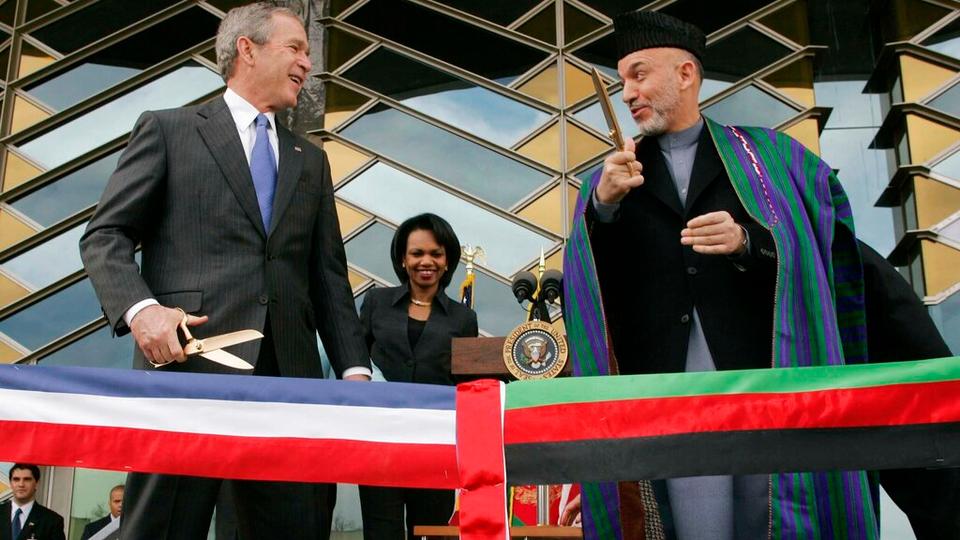Meanwhile, British Defence Minister Ben Wallace says the UK will work with the Taliban should they enter the government in Afghanistan if it adheres to rights norms.

Former
US president George W Bush has criticised the withdrawal of NATO troops
from Afghanistan and said civilians were being left to be “slaughtered”
by the Taliban.
The former US president’s statement, released in an interview to German broadcaster Deutsche Welle on Wednesday, comes ahead of senior Afghan leaders flying to Doha for long-stalled talks with the Taliban this week.
"Afghan women and girls are going to suffer unspeakable harm. This is a mistake... They're just going to be left behind to be slaughtered by these very brutal people, and it breaks my heart," Bush said.
The former Republican president, who sent troops to Afghanistan in autumn 2001 after the September 11 attacks on New York's World Trade Center, said he believed German Chancellor Angela Merkel "feels the same way".
Bush said Merkel, who is set to retire from politics later this year after 16 years in power, had brought "class and dignity to a very important position and made very hard decisions".
Sides travel to Doha this week for talks
Meanwhile, the eight-member delegation will include senior Afghan peace official Abdullah Abdullah and former president Hamid Karzai, and is expected to discuss the speeding up of peace talks, a government official told Reuters on the condition of anonymity.
The Taliban did not immediately respond to requests for comment on the talks, which are separate from the stalled intra-Afghan negotiations taking place between Taliban and Afghan government negotiators in the Qatari capital of Doha.
'UK will work with Taliban should they come to power'
Meanwhile, UK Defence Minister Ben Wallace told the Daily Telegraph in an interview published on Tuesday that UK will work with the Taliban should they enter the government in Afghanistan.
"Whatever the government of the day is, provided it adheres to certain international norms, the UK government will engage with it," he was quoted as saying in the newspaper.
However, Wallace warned that UK will review any relationship "if they behave in a way that is seriously against human rights".
The Taliban, who ruled Afghanistan with an iron fist from 1996 to 2001, have been fighting for 20 years to topple the Western-backed government in Kabul.
Emboldened by the departure of foreign forces by a September target, the group is making a fresh push to surround cities and gain territory.
Taliban officials said last week the group had taken control of 85 percent of territory in Afghanistan.
'More suffering'
US and NATO forces began withdrawing from Afghanistan in early May and are due to completely pull out by September 11, some 20 years after they arrived in the war-torn country.
Most of the 2,500 US and 7,500 NATO troops who were in Afghanistan when US President Joe Biden detailed the final withdrawal in April have now gone, leaving Afghan troops to fight an emboldened Taliban seemingly bent on a military victory.
The country is facing a crisis as the insurgents snap up territory across the countryside, stretching government forces and leading to a fresh wave of internally displaced families, complicated by a renewed outbreak of Covid-19.
The United Nations said on Sunday the rising conflict is causing "more suffering" across the violence-wracked country as it called for continuous financial aid.
Biden has insisted, however, that it is time for US involvement in the war to end and for Afghans to chart their own future.
Source: AFP
Social media is bold.
Social media is young.
Social media raises questions.
Social media is not satisfied with an answer.
Social media looks at the big picture.
Social media is interested in every detail.
social media is curious.
Social media is free.
Social media is irreplaceable.
But never irrelevant.
Social media is you.
(With input from news agency language)
If you like this story, share it with a friend!
We are a non-profit organization. Help us financially to keep our journalism free from government and corporate pressure.












0 Comments